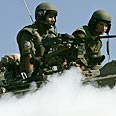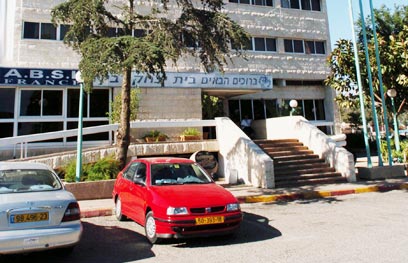
Soldiers in Kiryat Shmonah
צילום: רויטרס
Frontline hotel
During Operation Peace for the Galilee, the North Hotel in Kiryat Shmonah was the last stop for IDF soldiers before Lebanon. “I remember that my older brother would tell me about the North Hotel,” David, a gunner, reports. “When I said to my mother that we stopped in this hotel, she immediately started crying”
It’s Friday evening in the dining room of the North Hotel in Kiryat Shmonah. Over 300 soldiers, both reservists and conscripts, are quietly eating dinner. Over the meal, they discuss the course of the fighting in Lebanon in hushed tones. In the upcoming days, they expect to cross the border, and meanwhile, they tensely wait to be called.
At the North Hotel, also known as the Yitzchak Rabin Soldier’s House, no one remembers a scene like this. For the past six years, the hotel has been hosting IDF vacationers. At one point, a private contractor tried his hand, unsuccessfully, at hotel management, but now the Friends of the IDF run the place, rarely at full occupancy.
Everything changed when two IDF soldiers were kidnapped near the Lebanese border. Since then, hundreds of soldiers have come through the hotel. In fact, four or five soldiers have been staying in each of the ninety modest rooms, which normally hold two or three a piece, at most.

The North Hotel (Photo: Effi Shrir)
A short while before Shabbat, several Friends of the IDF trucks pull up to the hotel parking lot and deliver fresh food, including fruits and vegetables, and gifts for the soldiers. A group of artillery soldiers, who have spent the last few days firing missiles at Hizbullah positions, assist with the unloading.
There's no choice
David, 20, a gunner from Carmiel, sits in the cafeteria. He has spent hours glued to the television, which is now reporting on the Katyushas raining down on Haifa.
“I remember when my older brother would tell me stories about the North Hotel,” David reports. “He would sleep here on his way to Lebanon. When I told my mother that we stopped at the North Hotel, right away she started crying and said: ‘That’s a waiting hotel. You’re on your way in?’ I immediately calmed her down and explained to her that there’s no choice. We’ll do what has to be done in order to end the nonstop Katyushas.”
During Operation Peace for the Galilee, the hotel employed a full complement of kitchen crew, chambermaids and janitors. In the six years since the withdrawal from Lebanon, many workers were let go, but now the hotel is desperately understaffed. Yitzchak Moyal, the hotel manager, and Eli Zefrani, the head of operations, are basically single-handedly running the place. The soldiers help out when they can.
“No one here wants to return to the nightmarish images of the Lebanon days,” Zefrani says. “People are apprehensive about a ground invasion and afraid that we’ll have many casualties. But we trust the army and believe that everything will work out in the end for the security of the North.”
In the mean time, the skeleton staff has been working hard to spoil the soldiers as they head off to battle. “It’s very important that all the soldiers who pass through here receive whatever equipment they need,” Zefrani relates. “At this time, Kiryat Shmonah is almost empty; only a few thousand have remained here. Now there are mostly soldiers who are preparing for a massive incursion into Lebanon.”
Long and difficult battle
The soldiers spend most of their time in the lobby, analyzing the fighting. Several of them had been to the hotel before; they would head to the hotel’s pool after returning from a kayaking trip. It now seems surreal that, this time, they are not here for a vacation; they have come to fight Hizbullah.
“This will be a long and difficult battle,” Captain D. of the infantry predicts. “We don’t know too much about the mines that are there or about any additional hidden cells.”
Another soldier finds it hard to believe that he is likely to soon find himself in Lebanon. “We are the generation that enlisted after the Lebanon era,” he observes. “We all thought that this nightmare was behind us. But here we are, and nothing has changed. Within a day or two, we are all going in. No one knows how it will end.”
The soldiers sound edgy and homesick, but they insist that there is no choice. The war must be fought.
“Over the course of the years, Hizbullah was permitted to spread out along the border, opposite IDF installations, near IDF positions and settlements,” Lieutenant M. notes. “They were given the opportunity to arm themselves, and now they’re surprising us. In general, it seems that we don’t exactly know how many terrorists there are in each spot and how many surprises are waiting for us in this accursed place.”
'We are at war'
A., a soldier of the artillery battery that has been deployed along the border, is also not very optimistic. “It’s hard to lose fighters, as we did in the past few days. But there’s nothing to do about it. We are at war,” he asserts. “The coming days will apparently be even harder, but we have to do this.”
Omer, a member of the Egoz Company, which has already lost five soldiers, sits off to the side. “Who knows how many sacrifices this will cost us,” he muses. “But once and for all, we must hit Hizbullah’s leadership.”
He pauses for a minute and then utters a short prayer. “Who knows? Maybe in the end, after all this fighting, the North Hotel will no longer be needed for accommodating soldiers on their way to Lebanon, because everything will be finished.”










